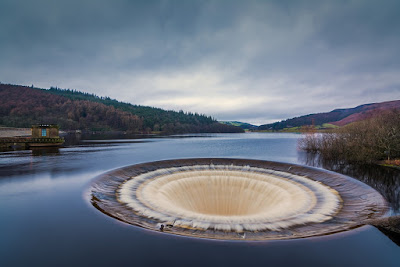The Environment Agency Report – key findings
The Environment Agency report on water resources in England looked closely at the current state of water resources nationwide and projected how this may look in the future. In 2016, 9500 billion litres of freshwater were taken from rivers, lakes, reservoirs and underground sources, with the biggest abstracter being public water companies (55% of all water abstraction). The report evidenced the impact of current pressures on water resources; in 2017, abstraction was unsustainable for 28% of groundwater bodies and up to 18% of surface waters, preventing 6-15% of river water bodies meeting good ecological status.
 |
| Figure 1: Water abstraction from Ladybower Reservoir, Derbyshire |
Pressure on water resources is expected to greatly increase as a result of a growing population, climate change and changes in land use, resulting in huge water shortages in England by 2050. The report suggests that, currently, 3 billion litres of water is wasted per day through leakage alone. This is the equivalent to the daily water needs of 20 million people. Further water is lost through wastage in homes and losses in water treatment processes.
The problem is far-reaching and a multifaceted approach is needed to tackle the issues raised. The Environment Agency has suggested three key measures:
- Public attitude change towards water use
- Industry innovation and behavioural change to reduce water use and water wastage
- Water company investment in infrastructure to address leakage issues rather than a reliance on offsetting leakage with water abstraction from the environment
 |
| Figure 2: Water leakage from piping |
A number of other STREAM projects are also tackling water shortage problems. There is much work on water infrastructure resilience with a long-term outlook on water abstraction rates and aquifer storage and recovery as an alternative to water abstraction from reservoirs. Finally, STREAM researchers have also focussed on water reuse, a process that reduces water abstraction from the environment by treating wastewater and reusing it for a beneficial purpose. Research has included the governance of water reuse and public perception of water reuse for non-potable use, a current barrier to its uptake.
Overall, the Environment Agency report highlights a number of problem areas that, at current rates, will result in water shortages in the not so distant future. STREAM research, in collaboration with water companies, is already working to alleviate some of the issues raised. In light of the report, there is now further motivation to focus on fixing these issues.
For further information, the full Environment Agency report is available for download, and further information on STREAM projects, past, present and future, are available at the STREAM website.
Environment Agency report: https://www.gov.uk/government/publications/state-of-the-environment
STREAM website: http://www.stream-idc.net/index.php